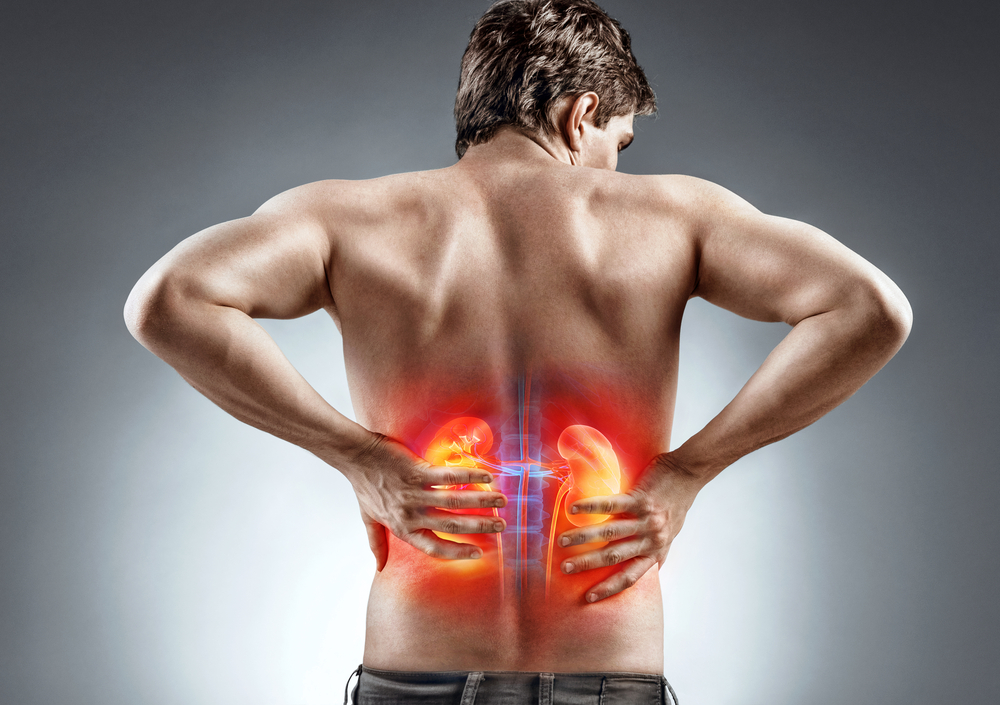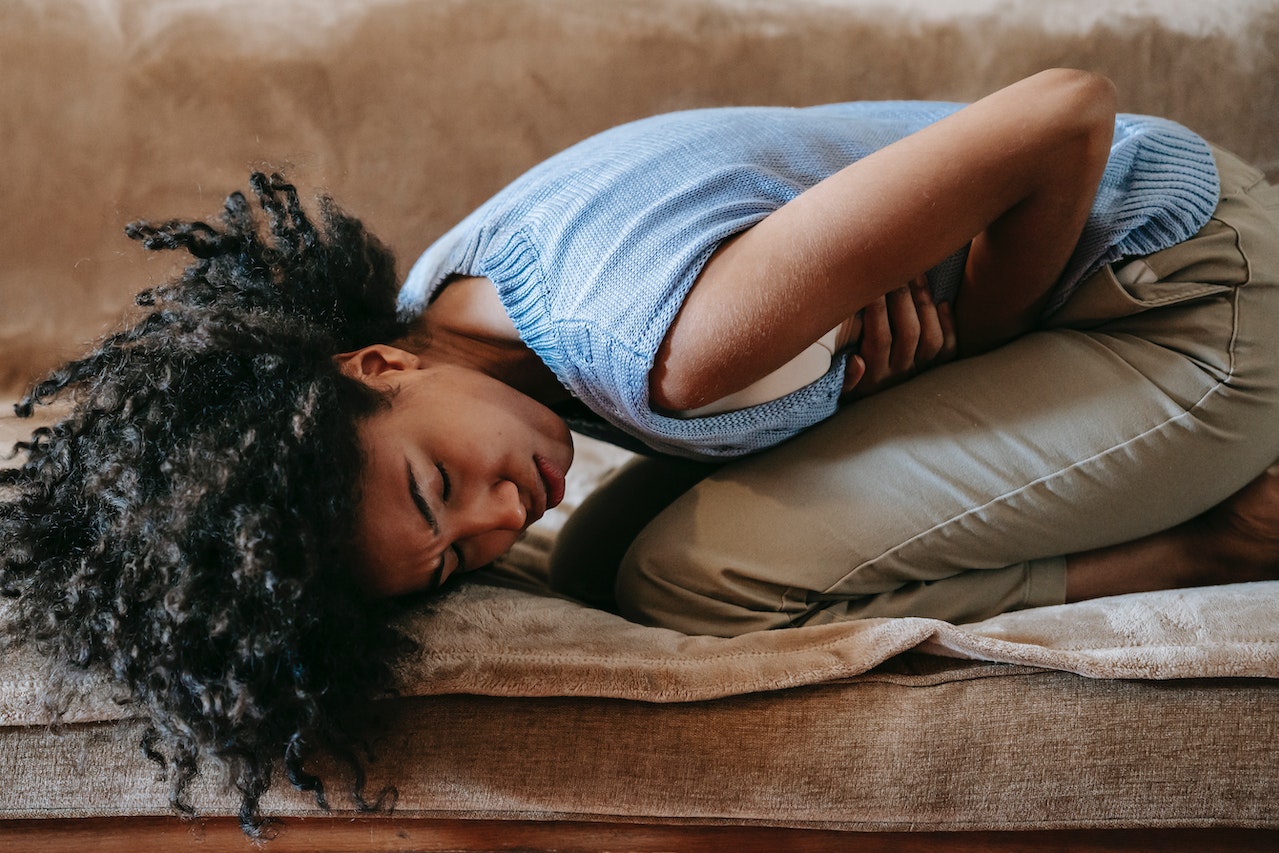Is My Kidney Causing My Back Pain?


Back pain can be a debilitating ailment affecting millions around the globe. Researchers estimate almost 10% of people worldwide endure some kind of back pain.
In the US alone, nearly 65 million Americans have reportedly suffered from back pain, with almost 8 percent of all adults (16 million) experiencing either persistent or chronic back pain. (1)
There are, of course, many causes such as strains, inflammation, arthritis, osteoporosis, ruptured discs, stress, or fibromyalgia.
It may also be likely that kidneys could be the source of backache. This is due to the position of the kidneys just below the ribcage that rest on muscles at either side of the spine; meaning many back complaints stem from kidney problems.
How To Tell If Kidneys Are Causing Back Pain
Kidneys have several functions. Their main job is to remove excess fluid from the body, cleanse the blood and transform toxins into the urine. Kidneys can filter up to 200 liters of fluid every 24 hours, removing up to 1.5 liters of fluid in urine.
The kidneys are also responsible for:
- Removing drugs and/or medications from the body.
- Stabilizing body fluids.
- Releasing hormones that regulate blood pressure.
- Converting vitamin D from the sun into an active form of vitamin D, which the body uses to support strong, healthy bones.
- Controling the production of red blood cells through the release of a hormone called erythropoietin, or EPO. (2)
When kidneys don’t work properly, harmful toxins and excess fluids can build up in the body. This may cause symptoms of kidney failure, which can include back pain.
In determining whether back pain is due to kidney problems, it is important to recognize where the pain is coming from. The severity and type of pain or any related symptoms should also be taken into account.
Kidney Pain
Due to the function of kidneys, they are susceptible to damage or infection. As a result kidney pain can occur and is often disguised as back pain.
When kidney pain happens both sides can be affected, however, it can often be more prevalent on the right side of the body. (3)
Right kidney pain may be caused by the following conditions, all of which can cause symptomatic back pain:
- Kidney Stones: Can cause severe pain in the sides, back, abdomen, and groin area. Drinking lots of water may help to pass (and prevent) kidney stones.
- Urinary tract infection.
- Renal trauma.
- Renal vein thrombosis.
- Polycystic kidney disease.
- Renal cell carcinoma (RCC).
Kidney pain can also spread to other areas of the body causing discomfort to the sides, abdomen, groin, or thighs.
Left Kidney
Although left kidney pain can also be caused by the above symptoms, often, discomfort is a result of other types of illness or injury such as the following conditions: (4)
- Muscle ache.
- Muscle or spinal injury.
- Nerve pain.
- Arthritis or joint pain.
- Rib injuries.
- Pancreas or stomach problems. Pancreatitis can cause both abdominal and back pain. Pancreatitis may also lead to kidney failure. (5)
- Digestive problems originating in the stomach or intestines.
Other Symptoms Of Kidney Conditions
There are several other indicators derived from kidney problems leading to irritation, aches, and pains:
- Cloudy, frothy, or bloody urine.
- Painful urination or a constant need to go to the bathroom.
- Nausea and an upset stomach.
- Vomiting.
- Loss of appetite.
- Constipation or diarrhea.
- Itching.
- Pins and needles in fingers or toes.
- Fever.
- Dizziness.
- Fatigue and feeling weak.
Severe kidney damage or problems may include the following symptoms:
- Bad breath (halitosis): Healthy kidneys filter out urea. When they are unable to do so, the surplus creates a foul, often fish-like odor. (6)
- Metallic taste.
- Shortness of breath: Due to an excess of fluid in the lungs, may leave your body starved of oxygen, leading to shortness of breath.
- Swelling of the legs, ankles, or feet due to excess fluid.
- Confusion: Too many toxins may affect brain functioning. (7)
- Irregular heartbeat: atrial fibrillation is one of the most common forms of irregular heartbeat and is linked to chronic kidney disease. (8)
- Muscle cramps.
Looking After Your Kidneys
Over time, kidney disease, or damage to kidneys may lead to kidney failure (or end-stage renal disease). There is no cure for end-stage renal disease and treatment includes dialysis or kidney transplant.
Often, kidney disease creeps up on a person over many years and is sometimes called the silent disease. To help keep kidneys healthy it is important to look after them by adopting a healthier lifestyle. Here are a few wellness ideas to help promote healthy kidneys:
- Quit smoking: Smoking can cause damage to the heart and blood vessels. Poor blood flow to the kidneys may lead to kidney damage. (9)
- Reduce alcohol: Kidneys have to work harder to filter out alcohol from the body and make it less able to clean the blood of toxins. (10)
- Drink plenty of water: Staying hydrated by drinking plenty of water helps kidneys to function properly and to flush out toxins from the body.
- A healthy balanced diet full of nutrients and vitamins can help promote kidney health
- Exercise and weight management can help to regulate blood pressure. Keeping blood pressure at an optimum level can help to protect kidneys.
- Control diabetes. Making lifestyle changes to control diabetes may help to avoid complications including kidney damage. (11)
Conclusion
If you’re experiencing constant pain in your back or sides, it is important to pay a visit to your doctor. It may be a kidney problem that, without medical attention, could lead to permanent damage to the kidneys. Certain situations, such as kidney infections, may also lead to life-threatening complications.
Kidney pain usually occurs below the rib cage on either side of a person’s spine, or sometimes just one side depending on the condition. It can also feel as though the pain is coming from deep within the body, and can spread or be experienced in other areas such as the abdomen, groin, or thighs.
Habitual changes can help to improve kidney pain and may lead to a healthier lifestyle, and overall well-being.
Sources
- https://hpi.georgetown.edu/backpain/
- https://www.uofmhealth.org/health-library/abr9104
- https://www.healthline.com/health/right-kidney-pain
- https://www.healthline.com/health/left-kidney-pain#Overview
- https://www.mayoclinic.org/diseases-conditions/pancreatitis/symptoms-causes/syc-20360227
- https://www.jenniferschaudds.com/the-connection-between-kidney-disease-and-bad-breath/
- https://www.ncbi.nlm.nih.gov/pmc/articles/PMC6707423/
- https://pubmed.ncbi.nlm.nih.gov/26769703/
- https://kidneyresearchuk.org/kidney-health-information/about-kidney-disease/am-i-at-risk/smoking-and-kidney-disease/
- https://www.kidney.org/news/kidneyCare/winter10/AlcoholAffects
- https://www.ncbi.nlm.nih.gov/pmc/articles/PMC6139827/









